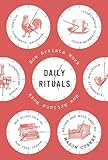“The Danish philosopher’s day was dominated by two pursuits: writing and walking. Typically, he wrote in the morning, set off on a long walk through Copenhagen at noon, and then returned to his writing for the rest of the day and into the evening. The walks were where he had his best ideas, and sometimes he would be in such a hurry to get them down that, returning home, he would write standing up before his desk, still wearing his hat and gripping his walking stick or umbrella.
Kierkegaard kept up his energy with coffee, usually taken after supper and a glass of sherry. Israel Levin, his secretary from 1844 until 1850, recalled that Kierkegaard owned “at least fifty sets of cups and saucers, but only one of each sort”—and that, before coffee could be served, Levin had to select which cup and saucer he preferred that day, and then, bizarrely, justify his choice to Kierkegaard. And this was not the end of the strange ritual. The biographer Joakim Garff writes:
“Kierkegaard had his own quite peculiar way of having coffee: Delightedly he seized hold of the bag containing the sugar and poured sugar into the coffee cup until it was piled up above the rim. Next came the incredibly strong, black coffee, which slowly dissolved the white pyramid. The process was scarcely finished before the syrupy stimulant disappeared into the magister’s stomach, where it mingled with the sherry to produce additional energy that percolated up into his seething and bubbling brain—which in any case had already been so productive all day that in the half-light Levin could still notice the tingling and throbbing in the overworked fingers when they grasped the slender handle of the cup.”
https://www.amazon.com/Daily-Rituals-How-Artists-Work/dp/030...
https://www.theguardian.com/science/2013/oct/05/daily-ritual...
However what will help is doing it differently. Can you do time blocking? I assume that while you are doing interesting things at work, no one notices or cares. That is a great job! So why not block your 1st half to do the necessary boring work, and the second half the interesting work. Win Win! I agree this may need some discipline but think of it as a daily ritual! Btw, many greats [1] have had rituals like this, so who knows? :-)
The other aspect you might be missing is 'when interesting things turn boring'. Usually that happens when you want to ship the product and you hit the long tail of shipping. Try replacing 'doing interesting' vs 'doing interesting and shipping'. But we don't want to give up the idea of doing only interesting? That happens when you can work through the boring parts of shipping an interesting piece of work. Keep trying and you will find it, then find a job in that domain or do your startup in that domain and you are set. I realised 3D graphics was my calling the same way, so I am saying from experience.
[1] : https://www.amazon.com/Daily-Rituals-How-Artists-Work/dp/030...
[1] https://www.amazon.com/Daily-Rituals-How-Artists-Work/dp/030...
[1] http://www.amazon.com/Daily-Rituals-How-Artists-Work/dp/0307...
Everyone in the book sleeps, eats, drinks wine, and finally works for a couple hours when they can be alone. Later a little bit of opium.
It leads to the same conclusion -- 4 hours of work is about the maximum for any creative or intellectually rigorous field of work.
http://www.amazon.com/Daily-Rituals-How-Artists-Work/dp/0307...

Waking in HCM can be hardcore. I always travel with a shirt to change into when I arrive, and go through several pairs of boots per year.